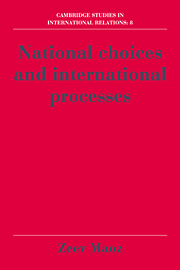Book contents
- Frontmatter
- Contents
- List of figures
- List of tables
- Preface
- 1 Toward a theory of international processes
- 2 Foreign policy decision making: assumptions and characterization of the approach
- 3 The inputs of decision making: identification and conceptualization
- 4 The essential mathematics of inputs
- 5 Models of the decision process
- 6 A formal characterization of decision processes
- 7 A theory of foreign policy decision making
- 8 The analysis of international outcomes
- 9 The evolution of international processes
- 10 Individual preferences, national choices, and international systems
- References
- Name Index
- Subject Index
Preface
Published online by Cambridge University Press: 05 February 2012
- Frontmatter
- Contents
- List of figures
- List of tables
- Preface
- 1 Toward a theory of international processes
- 2 Foreign policy decision making: assumptions and characterization of the approach
- 3 The inputs of decision making: identification and conceptualization
- 4 The essential mathematics of inputs
- 5 Models of the decision process
- 6 A formal characterization of decision processes
- 7 A theory of foreign policy decision making
- 8 The analysis of international outcomes
- 9 The evolution of international processes
- 10 Individual preferences, national choices, and international systems
- References
- Name Index
- Subject Index
Summary
This book started to take shape quite a long time ago. As a graduate student at the University of Michigan, I wrote a long paper reviewing the decision making approach to world politics. While working on this paper I was impressed both by the tremendous progress in this field and by the significant degree of cumulative research. However, I was also struck by the large number of conflicting models, propositions, and inconclusive empirical findings. The paper concluded with a plea for an integrative framework that would attempt to put together the main ideas of the various approaches under a single theoretical view.
As time went by, and as I became involved in empirical research on foreign policy decision making, I became increasingly convinced that an integration of decision making theories – though a significant contribution – would not solve the main problems of the approach as a whole. The rationale for studying international politics from a decision-theoretic perspective is the notion that the world is shaped by people and their choices rather than by a hidden hand operating above and beyond the nation state. Yet, decision theories – no matter how sophisticated – fall short of providing adequate theoretical bridges between people, their choices, and long-range international processes.
- Type
- Chapter
- Information
- National Choices and International Processes , pp. xvii - xviiiPublisher: Cambridge University PressPrint publication year: 1990

